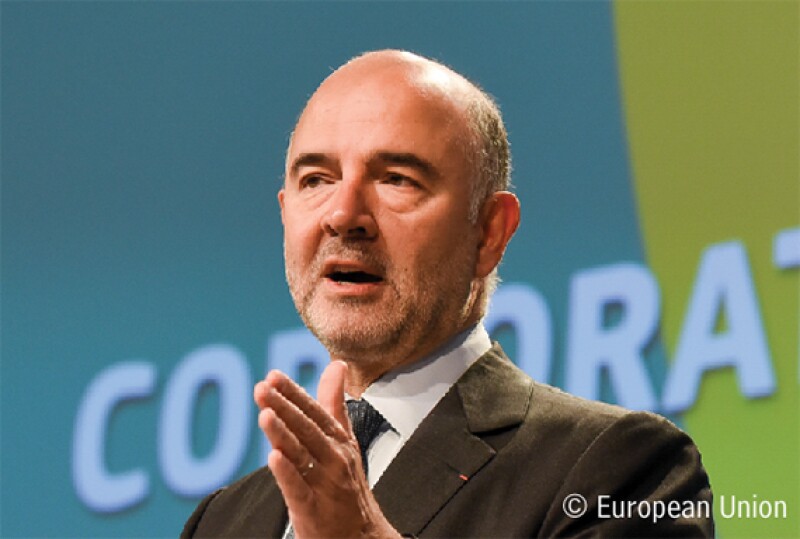
|
Pierre Moscovici was also in the Global Tax 50 2015 and 2014 |
As one of the most important agenda-setters for EU tax policy, European Commissioner Pierre Moscovici has made it into this year's Global Tax 50 after one year of absence. Moscovici oversees tax policy in his role on the European Commission. He speaks to International Tax Review about the achievements of the past year and what lies ahead in 2018.
A key part of the Juncker Commission's focus has been the challenges of tax avoidance and how to tackle this threat to the budgets of national governments across the EU, one major initiative being the common consolidated corporate tax base (CCCTB). When it comes to such matters, Moscovici is optimistic about the prospects for the coming year.
"The public debate around fairer taxation means that we now have a real chance to make lasting changes. We must seize that chance," Moscovici says. "We've already done a lot, but for 2018 I see three major avenues for progress."
"First, I want to see an EU level agreement on our proposal for new transparency rules for advisers and intermediaries who help to put in place tax avoidance structures," he says. "We will be keeping up the pressure on EU countries to adopt the CCCTB. True reform of how corporate tax works in the EU is needed to solve the problem of cross-border tax avoidance once and for all, to the benefit of all Europeans."
"The Panama and Paradise Papers and tales of large-scale tax avoidance by big companies have brought much greater public attention to the ways in which tax avoidance and tax evasion have been able to infiltrate our tax systems on such a grand scale," he adds.
The Commission plays a key role in supporting the proposals adopted by the European Council. Most recently, it compiled a list of 17 uncooperative tax jurisdictions and a separate grey list. The idea is that these lists will be updated on an annual basis, but these lists have been criticised by anti-tax avoidance campaigners for not going far enough in singling out certain states.
These efforts complement the EU's Anti-Tax Avoidance Directive (ATAD). The ATAD carries strong measures for a common strategy to counter tax avoidance. "I'm confident that once the new rules have kicked in, we will see strong results and higher revenues for the coffers of member states," Moscovici says.
Taxing the digital economy
Beyond tackling tax avoidance, the European Commission is watching the burgeoning online economy closely and looking to establish a digital tax framework. As part of this project, the EU and the OECD have both opened their own consultation process on how online business should be taxed. This could be the starting point for major policy initiatives in 2018.
"The digital economy is an industry that mainly deals with intangible assets and does not recognise borders. That is why we are actively contributing to the global work on this at the OECD to try to achieve international solutions," Moscovici says. "I'm looking forward to seeing the fruits of that work. But the EU must have specific and targeted solutions that suit and protect our single market."
"All options are being examined so that we can deliver those solutions in early 2018," he continues. "I'm optimistic that we can quickly move ahead on this so that in the future, digital giants will contribute appropriately to the public finances of the countries in which they earn their profits."
The difficulty for the EU is the plethora of different business models used by online companies. The European Commission has identified at least four archetypes, such as online retail, social media, subscription and collaborative platforms. There are also companies that are hybrids of these business models.
Some European countries are already exploring options on this front. For instance Germany, France, Italy and Spain have come out in support of an equalisation tax, which would amount to a special levy on the turnover of digital companies. But the Juncker Commission is keen to avoid unilateral actions that may make it harder to find a common solution.
Moscovici has made it clear that the Commission wants to establish a level playing field for companies, but this still leaves the question of how this should be achieved. This includes the CCCTB, which would create the framework for revising the rules around permanent establishments.
"At the most basic level, it simply makes sense for big companies to have an easier and cheaper way to calculate their taxes in the EU, in turn making it easier and cheaper for them to operate cross-border," Moscovici says. "A stable tax environment, attractive schemes for R&D and the raising of equity complete the picture of the benefits this reform would bring for multinationals."
The Global Tax 50 2017 |
|
|---|---|
The top 10 • Ranked in order of influence |
|
6. Arun Jaitley |
|
The remaining 40 • In alphabetic order |
|
| The Estonian presidency of the Council of the European Union |
|
| International Consortium of Investigative Journalists (ICIJ) |
|
| United Nations Committee of Experts on International Cooperation in Tax Matters |
|









